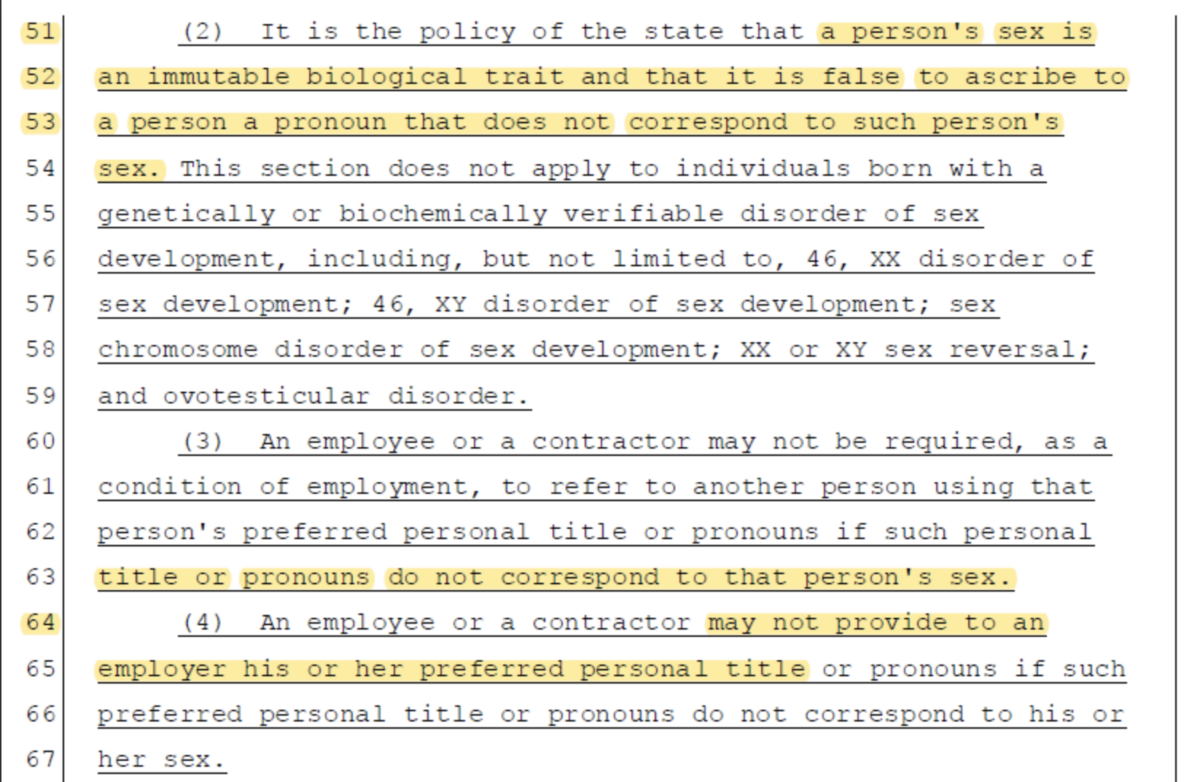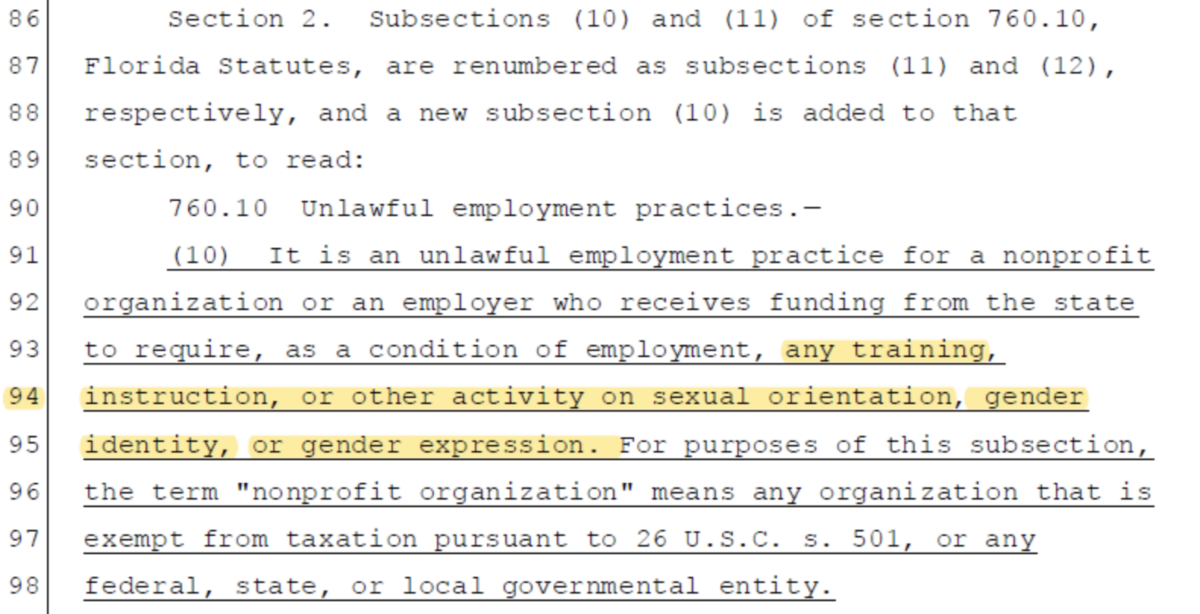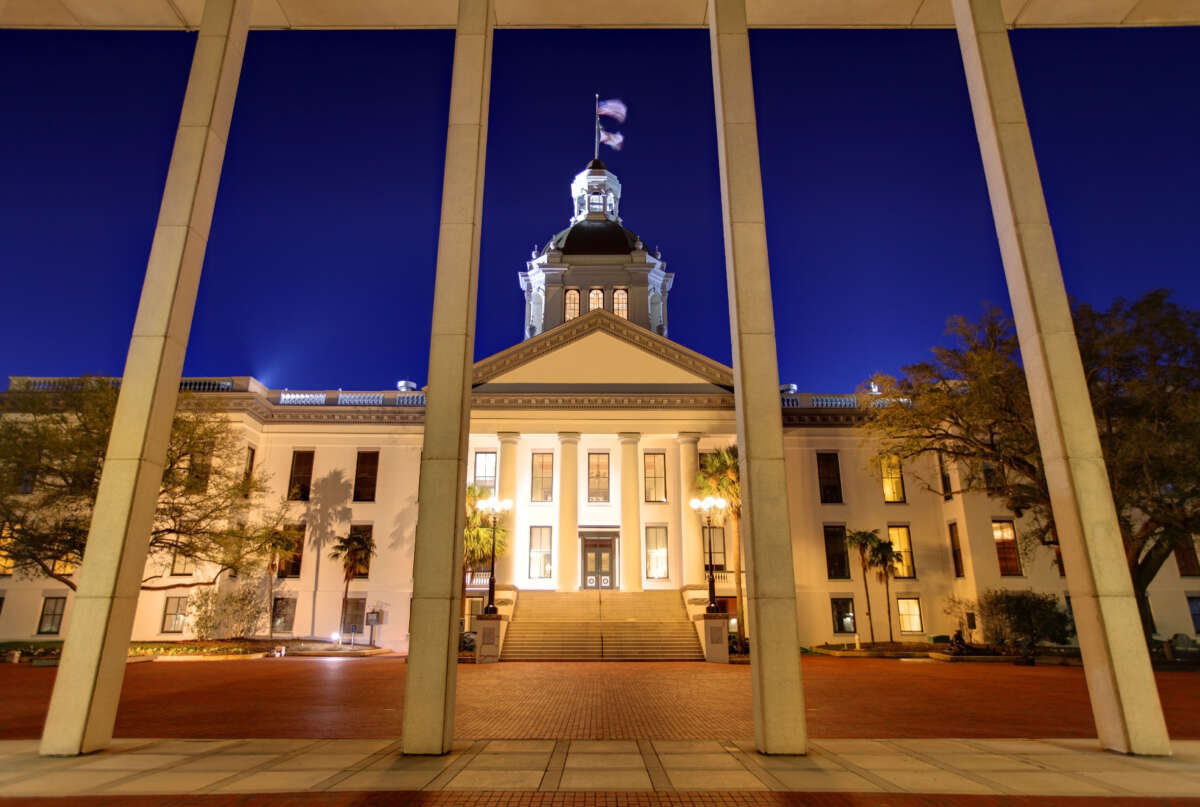Support justice-driven, accurate and transparent news — make a quick donation to Truthout today!
A new bill just introduced in Florida aims to expand “Don’t Say Gay Or Trans” provisions to a broad range of workplaces. Targeting government employees, contractors, and nonprofits, the bill sets forth restrictions and bans on policies relating to pronouns, gender identity, and sexuality. Specifically, it would prohibit state and local government employees as well as any contractors engaged with the government from changing their pronouns or honorifics if they do not match their assigned sex at birth. It would also bar them from instructing on gender identity or sexuality, similar to “Don’t Say Gay Or Trans” laws already active in the state education system. The legislation would establish “biological” pronouns as official state policy. The bill also would establish protections for what it calls “deeply held biology-based beliefs.” Perhaps most frighteningly, it may even prevent all nonprofits in the state from mandating any “training, instruction, or other activity on sexual orientation, gender identity, or gender expression,” a clause that could destroy LGBTQ+ nonprofits across Florida.
The bill, HB599, was introduced by Representative Ryan Chamberlin, a Republican. The bill is split into two sections, with the first section applying to government employees and contractors, which it defines as “an individual, partnership, corporation, or business entity” that “enters or attempts to enter into a contract for services” with any state, county, municipality, or special district of Florida. These definitions encompass a huge number of businesses, such as stadiums, convention centers, major hospitals, insurance agencies, and more. For these businesses, as well as for all government workers, the bill would declare that it is the state’s policy that “a person’s sex is an immutable biological trait and that it is false to ascribe to a person a pronoun that does not correspond to such person’s sex.” It then would bar covered employees from sharing pronouns that “do not correspond to that person’s sex,” effectively banning social transition at work for these employees.
See the provisions barring pronouns, honorifics, and more here:

The bill also would enshrine a new phrase into law: protections for employees “deeply held religious or biology-based beliefs.” The phrase “deeply held religious beliefs” has longstanding precedent in constitutional law and is used to overturn laws judged to be violating someone’s freedom of religion. Deeply held “biology-based” beliefs, however, are not something that has ever been a part of any law. It would appear that this line is meant to provide religious-based protections to people who assert that their misgendering of transgender people and using transgender people’s old names is part of their “biology-based” rights.
The bill is not limited in its application to government employees and contractors, however. A separate section of the bill would apply to “nonprofit organizations or an employer who receives funding from the state.” In the most broad reading of this section, separating “nonprofit organizations” from “employers who receive funding from the state,” it would bar all such organizations from mandating “training, instruction, or other activity on sexual orientation, gender identity, or gender expression.”
See this section here:

This provision is severe in its potential impact. Virtually every LGBTQ+ organization would be radically affected by it and would likely have to shut down. It would be nearly impossible for an LGBTQ+ organization to run without providing instruction, training, and “other activity” around gender identity or sexuality. It would be a blatant power grab by the state targeting organizations critical to the government and would further drive LGBTQ+ activism and organizing underground in the state. If enforced broadly, this section could have a similar impact to laws in Russia designed to shut down LGBTQ+ organizations there.
This section would have impacts far beyond LGBTQ+ organizations as well. The provisions would apply to “any organization that is exempt from taxation” including “s. 501” organizations. This would include, for instance, 501c4s, which are crucial during election cycles and could be used to target left-leaning organizations running election ads. Many of these organizations have LGBTQ+ employees and provide instruction and accommodations for their employees, which would be barred by the state if this gets passed into law.
It could also have impacts on medical organizations that do business with state and local governments. Planned Parenthood, a 501c3, heavily provides care for LGBTQ+ people, and such a law could be used to target the organization statewide. Likewise, many state hospital systems that do business with the government often must educate employees and patients on HIV and AIDs, which is impossible to divorce from LGBTQ+ issues. Community health clinics would, similarly, have to contend with these provisions.
This legislation represents an early move in what promises to be a challenging year for anti-LGBTQ+ legislation in 2024. Historically, Florida has often been the breeding ground for new laws aimed at the LGBTQ+ community. This bill might well serve as a precursor to the next “model policy” that could be replicated in multiple states, and bears close watching.
This piece was republished with permission from Erin In The Morning.
A terrifying moment. We appeal for your support.
In the last weeks, we have witnessed an authoritarian assault on communities in Minnesota and across the nation.
The need for truthful, grassroots reporting is urgent at this cataclysmic historical moment. Yet, Trump-aligned billionaires and other allies have taken over many legacy media outlets — the culmination of a decades-long campaign to place control of the narrative into the hands of the political right.
We refuse to let Trump’s blatant propaganda machine go unchecked. Untethered to corporate ownership or advertisers, Truthout remains fearless in our reporting and our determination to use journalism as a tool for justice.
But we need your help just to fund our basic expenses. Over 80 percent of Truthout’s funding comes from small individual donations from our community of readers, and over a third of our total budget is supported by recurring monthly donors.
Truthout has launched a fundraiser to add 500 new monthly donors in the next 10 days. Whether you can make a small monthly donation or a larger one-time gift, Truthout only works with your support.
